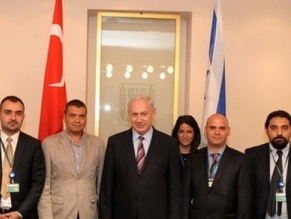|
World Jewish News

Israeli PM Benjamin Netanyahu told the Turkish media delegation: ''Turkey and Israel have relations that go back a long way. We need to find ways to restore the relationship that we had, because I think it is important for each of countries.”
|
‘British government mediating’ in Israeli-Turkish dispute, claims Israeli media
02.08.2012, Israel and the World The British government has stepped in as intermediary in ongoing efforts to bridge the diplomatic gulf between Israel and Turkey, reported Israeli media Wednesday.
The account by Israeli daily Ha’aretz, which claims the UK has been passing messages between the two sides, comes after both Israeli Prime Minister Benjamin Netanyahu and Foreign Minister Avigdor Lieberman met with Turkish journalists last week to state Israel’s wish of building bridges with the Turkish administration.
Diplomatic ties were cut by Turkish Premier Tayyip Erdogan following the controversial flotilla incident in May 2010, which saw nine Turkish nationals killed aboard a Gaza-bound Turkish aid ship after a skirmish with Israel Defence Force (IDF) soldiers. After Israel refused to apologise for the incident, Turkey made moves to indict the IDF personnel it held responsible for the incident.
Last week, Netanyahu met with a Turkish media delegation in Jerusalem to stress Israel’s commitment to ties with Turkey as representatives of “important, strong and stable” countries in an increasingly volatile Middle Eastern landscape.
According to a statement by the Prime Minister’s office, Netanyahu said: “Turkey and Israel have relations that go back a long way. We need to find ways to restore the relationship that we had, because I think it is important for each of countries.”
Lieberman likewise spoke to Turkish reporters shortly before his departure to Brussels for a meeting of the EU-Israel Association Council last week, to say “Israel is ready to solve any outstanding disputes with Turkey, but it will not apologise to Ankara”.
Erdogan had previously insisted that resumption of ties with Israel would hang on its willingness to apologise for the Mavi Marmara raid, but with the situation rapidly deteriorating in neighbouring Syria, he may be showing signs of reconsidering his position.
On Tuesday, reports emerged of US President Barack Obama engaging in a phone call with Erdogan, in which they discussed ways in which their respective countries could cooperate to speed along a democratic transition in Syria. Turkey has suffered an increasingly fractured relationship with once-close allies Syria, after it held authoritarian leader Bashar al-Assad responsible for the shooting down of a Turkish aircraft, killing two pilots.
According to a statement from the Turkish Premier’s office, the talks between Erdogan and Obama ‘took up the coordination of efforts t accelerate the process of political transition in Syria, including Bashar Assad leaving the administration and the meeting of the Syrian people’s legitimate demands.”
“Prime Minister Erdogan and President Obama agreed on the coordination of efforts to help Syrians forced to flee to Turkey and neighbouring countries,” it continued.
The US has increasingly placed pressure on the Israeli administration to resolve outstanding issues with Turkey for the sake of coordinating a united international approach to common foreign policy concerns. US Defence Secretary Leon Panetta is thought to have broached the subject on a visit to Israel this week, as part of wider discussions on the volatile situation in Syria and concerning Iran’s disputed nuclear weapons programme.
US Secretary of State Hillary Clinton similarly is thought to have urged Israel’s leaders to take any steps necessary to heal the diplomatic impasse, on her visit to the Jewish State earlier this month.
Rapidly rising Israel concerns over Syria’s chemical and biological weaponry falling into terrorist hands could well be the deciding factor in Israel’s decision to make amends, with Turkey being geographically well-placed to intervene in threats to neighbouring borders.
Turkey has itself stepped up its efforts to become a member of the EU in recent months, restoring diplomatic ties with France, a key opponent of its European accession after the leadership of former President Nicholas Sarkozy.
Turkey became embroiled in a diplomatic stand-off with the French government last year, after Sarkozy’s right-wing UMP party backed a bill in France’s lower house of parliament to make it a legal requirement to refer to the 1915 mass killings of Armenians by Ottoman Turks as a “genocide”.
Following Socialist candidate Francois Hollande’s victory in France in May, Davutoglu issued a statement saying Turkey looked to his succession to power as an opportunity for “a new course in the Turkish-EU relations”. His comments were followed up by an announcement that talks between Turkey and the EU would be reopened with the EU Commissioner for Enlargement Stefan Fule scheduling a visit to Ankara to discuss policy as a precursor to advancing its membership of the 27-member bloc.
The EU hopes that closer cooperation between Turkey and Europe will help utilise the Islamist administration’s influence in the Arab world to monitor the increasingly fractured situation in Syria. When the last integration talks ground to a halt seven years ago, Turkey turned towards further developing its relationships with its Middle Eastern neighbours.
Turkey remains convinced that membership of the EU would be mutually beneficial, as its Minister in charge of EU affairs Egemen Bagis insisted last month: “Turkey is changing, the EU is changing and the new Europe cannot be without Turkey,” he declared, continuing: “Until now, all countries that have started negotiations with the EU have become full members. Turkey will not be the first exception.”
EJP
|
|
